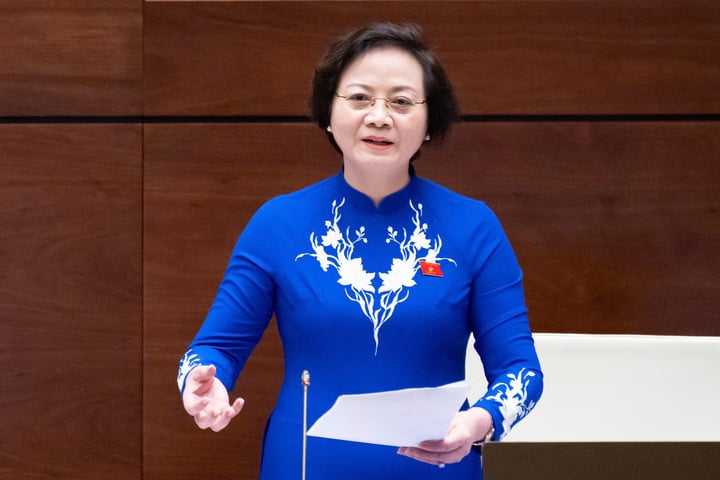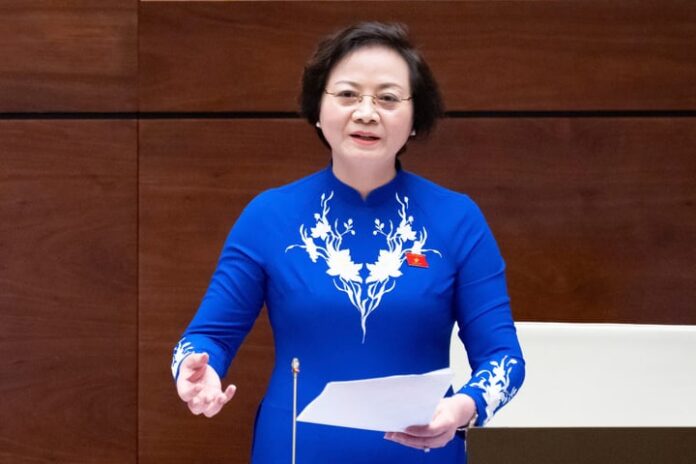The Ministry of Justice has published documents reviewing the draft Decree amending and supplementing a number of articles of Decree No. 29/2023 of the Government on streamlining the apparatus, drafted by the Ministry of Home Affairs.
According to the Ministry of Home Affairs, this Decree stipulates the subjects, principles, and policies of streamlining the apparatus and the responsibilities for its implementation within the agencies, organizations, and public non-business units of the Party, State, and socio-political organizations from the central to communal levels.

Minister of Home Affairs Pham Thi Thanh Tra. (Photo: quochoi.vn)
The drafting agency proposes four groups of subjects to implement the streamlining policy.
The first group includes officials, civil servants, and public employees; commune-level officials and those working under labor contracts who are subject to the same regime and policies as civil servants as stipulated by the Government. This group includes those who fall under one of the following cases:
– Surplus due to the review and rearrangement of the organizational structure and personnel as decided by the competent authority, or surplus due to the rearrangement of the organizational structure and personnel of public non-business units to implement the autonomy mechanism.
– Surplus due to the restructuring of officials, civil servants, and public employees according to job positions, but unable to be rearranged or assigned to other jobs; or arranged to another job but voluntarily applying for the streamlining policy and agreed by the direct managing agency, organization, or unit.
– Failing to meet the training standards for professional and vocational qualifications required for the current job position and unable to be arranged for another suitable job or retraining to standardize professional and vocational qualifications; or arranged for another job but voluntarily applying for the streamlining policy and agreed by the direct managing agency, organization, or unit.
– In the preceding year or the year of the streamlining consideration, evaluated as failing to complete the tasks; or evaluated as completing the tasks in the preceding year or the year of streamlining consideration but voluntarily applying for the streamlining policy and agreed by the direct managing agency, organization, or unit.
– In the preceding year or the year of streamlining consideration, the total number of days of sick leave is equal to or higher than 300 days, certified by the social insurance agency responsible for sick leave allowance payment in accordance with the current law; or in the preceding year or the year of streamlining consideration, the total number of days of sick leave is equal to or higher than the maximum number of days of sick leave specified in the law on social insurance, certified by the social insurance agency responsible for sick leave allowance payment according to the current law; voluntarily applying for the streamlining policy and agreed by the direct managing agency, organization, or unit.
– Officials, civil servants, and public employees in leadership or management positions who are no longer in office due to the rearrangement of the organizational structure or the restructuring and improvement of the quality of the leadership and management team as decided by the competent authority, or due to the decision of the competent authority to dismiss them from their leadership or management positions; voluntarily applying for the streamlining policy and agreed by the direct managing agency, organization, or unit.
The second group comprises individuals working under indefinite labor contracts and performing professional and vocational tasks in public non-business units as stipulated by the Government. They become surplus due to the rearrangement of the organization or restructuring of human resources as decided by the competent authority.
The third group includes non-professional staff at the commune level who will retire immediately upon the implementation of the two-level local government model as stipulated in the Law on Organization of Local Governments.
The fourth group consists of non-professional staff in villages and residential areas who become surplus due to the rearrangement of villages and residential areas and will retire immediately upon the issuance of the competent authority’s decision.
Strong enough policies are needed for non-professional staff at the commune level to retire immediately
Regarding the necessity of issuing the Decree, the Ministry of Home Affairs stated that Conclusion No. 137 of the Politburo and the Secretariat (on the Proposal to rearrange administrative units at all levels and build a model of two-level local government) requested to “stop using non-professional staff at the grassroots level (commune, ward, and town).” Conclusion No. 155 of the Politburo and the Secretariat (on the Proposal on some key tasks that need to be focused on in rearranging the organizational structure and administrative units from now until June 30) requested to “urgently issue policies and regimes to support non-professional staff at the commune level.”
“For the above reasons, there is a need for strong enough policies to address the regime for non-professional staff at the commune level to retire immediately when rearranging administrative units at the commune level,” said the Ministry of Home Affairs.
In terms of legal basis, the Ministry of Home Affairs cited Article 64 of the Law on Social Insurance 2024 (effective from July 1st) stipulating the conditions for enjoying retirement benefits as having mandatory social insurance contributions for at least 15 years.
Accordingly, it is necessary to amend the conditions related to the period of mandatory social insurance contributions to enjoy the policy of early retirement in Decree No. 29/2023 accordingly.
In addition, Decree No. 178/2024 (amended and supplemented in Decree No. 67/2025) of the Government stipulates policies and regimes for early retirement for those subject to streamlining, restructuring, and improving the quality of the team of officials, civil servants, and public employees. The regime is calculated based on five months of current salary (in Decree No. 29/2023, it is three months of average salary). To ensure correlation in policies and regimes for those subject to retirement due to streamlining, restructuring, and improving the quality of the team of officials, civil servants, and public employees, it is necessary to amend the method of calculating the early retirement policy in Decree No. 29/2023 accordingly.
For the above reasons, the Ministry of Home Affairs believes that it is necessary to issue a decree replacing Decree No. 29/2023 to ensure policy correlation and encourage non-professional staff at the commune level and in villages and residential areas to retire immediately.
High-Speed Rail Project: A Level Playing Field for Private Enterprises
According to numerous experts, private enterprises’ bold initiative to venture into high-speed rail development is a welcome and positive sign. However, it is crucial to proceed with caution as not all businesses may possess the requisite capabilities and resources to undertake such an endeavor successfully.
“Global Investment Firm Pours $3.5 Billion into Vietnam’s Economy through M&A Deals with Vingroup, Masan, and Imexpharm.”
On the afternoon of May 29, as part of his working trip to attend the 30th Asia Future Conference in Tokyo, Deputy Prime Minister Nguyen Chi Dung and his government delegation met with Mr. Tae-Won Chey, Chairman of SK Group.





















